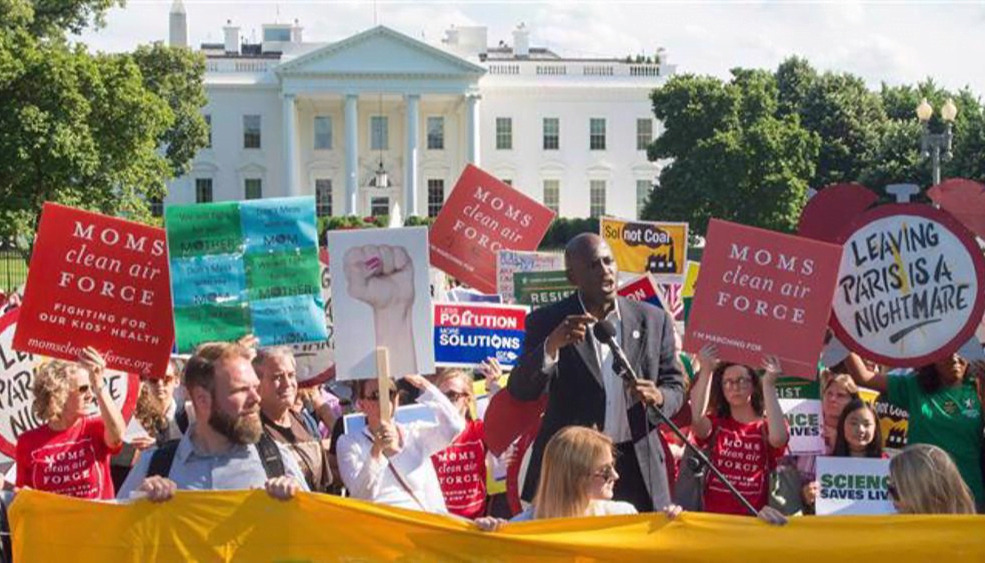
Protesters hold signs during a demonstration objecting to Donald Trump’s decision to withdraw the US from the Paris climate agreement. (Photo: AFP)
Washington, November 5 (RHC)-- The United States has formally exited the Paris climate accord, becoming the sole outlier in global efforts to slow down climate change. “The U.S. withdrawal will leave a gap in our regime, and the global efforts to achieve the goals and ambitions of the Paris Agreement,” UN climate chief Patricia Espinosa said on Wednesday.
Espinosa said the UN Framework Convention on Climate Change (UNFCCC), which the United States still remains a party to, would be “ready to assist the US in any effort in order to rejoin the Paris Agreement.” The announcement came one day after the U.S. presidential election, in which President Donald Trump is seeking a second term.
Trump’s Democratic rival, Joe Biden, has vowed to rejoin the agreement if elected. He has also promised to achieve net-zero emissions by 2050 under a sweeping 2-trillion-dollar plan to transform the economy.
The administration of former president Barack Obama had pledged under the deal to cut US emissions by 26-28 percent by 2025 from 2005 levels. Biden is broadly expected to ramp up those goals if elected.
Meanwhile, the Rhodium Group has said that in 2020, the United States will be at around 21 percent below the 2005 levels. It says that under a second Trump administration, it expects U.S. emissions to increase by more than 30 percent through 2035 from 2019 levels.
Trump first announced his intention to pull the United States out of the global agreement to fight climate change in June 2017, characterizing the decision as “a reassertion of American sovereignty.”
The move drew rebuke from Democrats at home and world leaders who had pressed Trump not to abandon the 197-nation accord. However, he was unable to formally do so until now because of the requirements of the deal.
In November 2019, the United States presented its withdrawal letter to the United Nations (UN), saying it would be officially out of the Paris accord on November 4, 2020, one day after the U.S. election.
The Paris agreement was reached on November 4, 2016 and has been signed by 197 countries. At least 135 of them have now formally ratified the agreement. They represent more than 75 percent of the world’s global greenhouse gas emissions.
The Paris agreement seeks to avert climate change by limiting global warming to no more than 2 degrees Celsius above pre-industrial temperatures by 2050. It also sets out a goal of reaching a limit of 1.5 degrees Celsius, if possible.
A report by the UN Environment Program released on November 2016 said annual emissions must be kept below 42 billion tons of CO2 (carbon dioxide) by 2030 for the world to have a chance to meet the goals set out in the Paris Agreement.
Even if emission-cutting pledges under the Paris Agreement are fully implemented, the predicted 2030 emissions could put the world on track for a temperature rise of 2.9 to 3.4 degrees Celsius this century, the report said.
Most scientists believe the world must cut emissions sharply and quickly in order to avoid the most catastrophic effects of global warming. China, Japan, South Korea, and the European Union (EU) have recently ramped up their carbon cutting targets.
The U.S. announcement comes against the backdrop of similar moves by the Trump administration to pull out of major international agreements since he came to office in early 2017.

